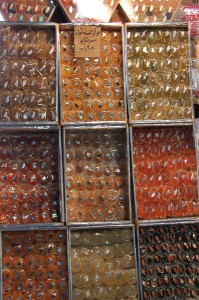The first settlements we pass after crossing from Lebanon into Syria are geometric heaps of concrete blocks against the pinkish soil. One or two blocks of flats are painted yellow or orange, but the general effect is tone on tone grey. On top of the blunt square tops of the housing blocks, a multitude of satellite dishes bristle in perfect alignment. They are as much part of the general form as the spines of a hedgehog. Red water tanks add a splash of colour to an otherwise drab landscape.
Once inside the old city of Damascus, everything is as elaborate as the typical inlaid Syrian jewellery boxes. The mosques are built in stripes of contrasting stone, the divans are heavy with embroidery and the panes in each glass lantern are a mix of primary colours. Every opening in the souq is a chromatic orgy. The glitter of the ‘gold souq’ is rivalled by the sweet stalls laden with candied fruits and other glossily wrapped confections. Heaps of multicoloured spices, fabrics and beads vie for attention. Ornate lamps hang from the high arched ceilings where shafts of sunlight, milky with dust, pierce the cool interior. The souq of Damascus, just off the legendary Straight Street, is considered the oldest authentic souq in the Arab world, a far cry from the tourist-traps of Marrakech. Every day except Friday, the walkways are full of locals shopping, chatting and eating ashta and pistachio ice creams.
With at least one day’s rest a week, combined with a family outing to the mosque (or church for the Christian minority), a strong community feeling, a fair share of sunshine and an abundance of fabulous food, life seems good in Damascus. Crowds of excited exuberant school children pour down the street and the young shoe polishers earn enough to stop for a coffee or ice cream break. Unlike the Palestinians in Lebanon, they are an integral part of normal society and, with age, will move on to other jobs.
Still, one of the polish boys tells us, England is the place to be. That’s where the real work is. What about the days of drizzle, the distance from family, the higher cost of living eating up the higher salary? He shrugs unmoved.
He doesn’t speak English. I imagine him sweeping grey streets in the rain, dwarfed by high rises, eating greasy chips alone in damp digs in front of late night TV. In fact, satellite would probably be the only constant with his current life.
I think of all those dishes distributing their false images of western society, flaunting an artificial ease of living, a perceived affluence, a licence to act on whim and plenty of bare flesh. I think of the pretence of freedom, the unrealistic friendships, the primped and botoxed beauty and the envy they arouse in western and eastern societies alike. Television is a great leveller.
